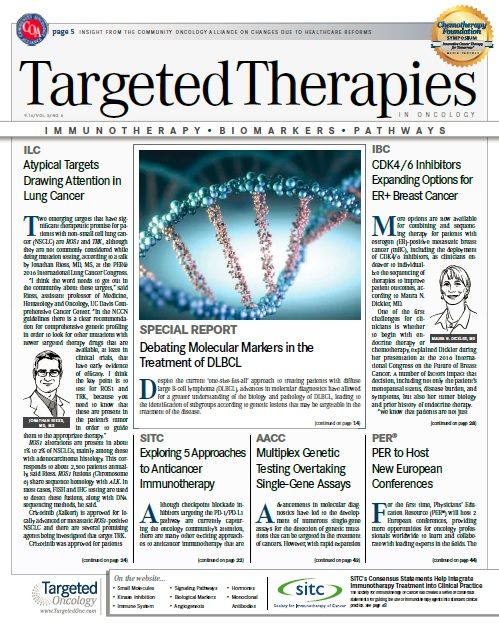SITC's Consensus Statements Guide the Integration of Immunotherapy Treatment Into Practice
As new drugs and combinations gain approvals for a broad range of malignancies, there is a growing need for disease-specific recommendations to help guide the integration of immunotherapy treatments into current practice.
The rapidly-growing field of cancer immunotherapy continues to garner enthusiasm due to positive and durable outcomes in responding patients for whom traditional therapeutic approaches have failed. As new drugs and combinations gain approvals for a broad range of malignancies, there is a growing need for disease-specific recommendations to help guide the integration of immunotherapy treatments into current practice. The evidence-based clinical practice guidelines provided by the National Comprehensive Cancer Network (NCCN) are a widely recognized resource and standard for the treatment of cancer, yet the NCCN guidelines do not cover the unique aspects of immunotherapy. In particular, guidance is needed to determine patient eligibility, assess responses due to the unique pharmacokinetics, and manage the immune-related toxicities associated with these agents.
To address the deficiency in physician resources regarding current best practices for the use of immunotherapeutics, the Society for Immunotherapy of Cancer (SITC) has established disease-specific panels of experts to attend to knowledge gaps associated with specific facets of the clinical management of immunotherapy, including patient selection criteria, the sequencing or combination of therapies, response assessment, management of toxicities, and clinical endpoints. Each panel is comprised of a multidisciplinary group of physicians as well as a combination of researchers, nurses, and patients or patient advocates invited from institutions across the United States, both SITC members and non-members, with the goal of publishing an evidence-based manuscript to be utilized as a set of guidelines for practicing oncologists.
SITC’s first consensus statement was published in 2013 to guide the use of immunotherapy for the treatment of melanoma.1In response to the ever-growing demand for expert advice on the optimal use of immunotherapy treatments, SITC has since appointed Task Forces (TF) to develop guidelines for genitourinary malignancies (kidney, bladder, and prostate cancer), hematologic malignancies, and lung cancer. The rapid changes in available immunotherapy treatment options for melanoma have also triggered an update to the original melanoma statement. New guidelines for kidney cancer, prostate cancer, hematologic malignancies, and a melanoma update are expected to be published in 2016, with statements for bladder and lung cancer slated for publication in 2017.
To ensure fairness and transparency, the Institute of Medicine’s (IOM) March 2011 Standards for Developing Trustworthy Clinical Practice Guidelines2were used as the infrastructure upon which the recommendations was established. For example, these standards provide guidance on the proper management of conflicts of interest, the selection of Task Force participants to include all populations expected to be affected by the development of guidelines, a preferred model for systematic reviews, the establishment of a rating system for the strength of evidence identified, and the means by which recommendations should be updated in the future.
The cancer immunotherapy guidelines’ Oversight Committee (OC) was established to serve as the mechanism for identifying new disease settings or recommending updates to an existing set of guidelines, and to help lead each new disease-specific panel. Once a TF is established, the scope of the project must be determined in order to develop questions that focus on critical aspects of FDA-approved immunotherapy treatments available for the malignancy of interest. These questions are intended to address key knowledge gaps in the clinical application of immunotherapy and are distributed as a survey to all TF members for the purposes of establishing an expert consensus opinion. A comprehensive literature search is also conducted to identify and evaluate literature according to the predetermined rating system. A bibliography is then compiled based on search results and serves as the evidence base for the strength of the recommendations that arise from the consensus opinions.
Each TF holds live meetings structured around the key knowledge gaps identified at the outset. The survey results and bibliography are discussed and any meeting outcomes, such as important conversation points and votes on key issues, are recorded for use in drafting the consensus statements. Drafts of the cancer immunotherapy guidelines are then routed for an extensive review process. Members of the TF and OC begin with an initial review, after which all SITC members are invited to review and provide comments. Consensus statements are then peer reviewed upon submission to the society’s Journal for ImmunoTherapy of Cancer, an open-access journal. Following publication, the guidelines will be reviewed annually by the OC and will be updated when evidence suggests the need for modification of clinically relevant information.
To learn more about how SITC’s consensus statements are addressing the need for disease-specific resources on the appropriate use of cancer immunotherapy, please visitsitcancer.org/targeted-therapies-oncology.
References:
- Kaufman HL, Kirkwood JM, Hodi FS, Agarwala S, Amatruda T, Bines SD et al. The Society for Immunotherapy of Cancer consensus statement on tumour immunotherapy for the treatment of cutaneous melanoma. Nature reviews. Clinical oncology 2013; 10: 588-98.
- Institute of Medicine Committee on Standards for Developing Trustworthy Clinical Practice G. In Graham R, Mancher M, Miller Wolman D et al. (eds): Clinical Practice Guidelines We Can Trust. Washington (DC): National Academies Press (US) Copyright 2011 by the National Acad- emy of Sciences. All rights reserved. 2011.

Survivorship Care Promotes Evidence-Based Approaches for Quality of Life and Beyond
March 21st 2025Frank J. Penedo, PhD, explains the challenges of survivorship care for patients with cancer and how he implements programs to support patients’ emotional, physical, and practical needs.
Read More